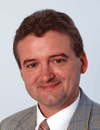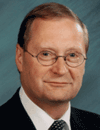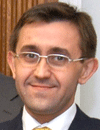Volker Hessel
Professor, Eindhoven University of TechnologyProf. Dr. Volker Hessel studied chemistry at Mainz University. In 1994 he became employee of the Institut für Mikrotechnik Mainz GmbH, being Director R&D in 2007. In 2005, he was appointed as part-time- and, in 2011, as full professor at Eindhoven University of Technology (honorary professor at Technical University of Darmstadt). He has published > 290 peer-reviewed papers and 10 books. He received the AIChE Award “Excellence in Process Development Research” (2007) and the ERC Advanced Grant “Novel Process Windows” (2010). He is Editor-in-Chief of the journal “Green Processing and Synthesis” at deGruyter. |  | | | Steven Ley
Professor, University of CambridgeProfessor Steven Ley has been the BP (1702) Professor of Chemistry at the University of Cambridge since 1992. He was a lecturer at Imperial College in 1975, promoted to Professor in 1983, and Head of Department in 1989. In 1990 he was elected to the Royal Society (London) and was President of the Royal Society of Chemistry from 2000-2002.
He has published over 730 papers and has gained 43 major awards including the Adolf Windaus Medal and August-Wilhelm-von Hofmann Medal from the German Chemical Society; Paul Janssen Prize for Creativity in Organic Synthesis; Davy Medal from the Royal Society; Messel Medal and the Innovation award from the Society of Chemical Industry; Yamada-Koga Prize from the Japan Research Foundation for Optically Active Compounds; Perkin Prize, Robert Robinson Lecturership and Medal, High Throughput Drug Discovery Methodologies Award, Tilden Medal, Corday Morgan Medal, Pedlar Lectureship & Medal, Simonsen Lectureship & Medal, Flintoff Medal, Haworth Memorial Lecturship & Medal, Award in Carbohydrate Chemistry, Award for Organic Synthesis, Award for Natural Product Chemistry and Teamwork in Innovation Award from the Royal Society of Chemistry, London; Nagoya Gold Medal from the Banyu Life Science Foundation International, Japan; Award for Creative work in Synthetic Organic Chemistry, American Chemical Society; Paul Karrer Gold Medal, University of Zurich; Hans Herloff Inoffen Medal, Helmholtz Zentrum für Infectionsforschung, Germany; Prous Institute-Overton and Meyer Award, European Federation of Medicinal Chemistry; The Tetrahedron Prize for Creativity in Organic Chemistry, Elsevier; Heinrich Wieland Prize, Boehringer Ingelheim, Germany; The Paracelsus Prize, Swiss Chemical Society; The Royal Medal, The Royal Society, London.
Professor Ley's work involves the discovery and development of new synthetic methods and their application to biologically active systems. The TPAP catalytic oxidant that is now used worldwide and cited extensively was one of his inventions. His group has published extensively on the use of iron carbonyl complexes, organoselenium chemistry, the use of microwaves in organic chemistry, biotransformations for |  | | | Tyler McQuade
Associate Professor, Florida State UniversityDr. Tyler McQuade recently joined the Organic Division of the FSU Department of Chemistry and Biochemistry as Associate Professor. An Assistant Professor at Cornell University from 2001-2007, Professor McQuade graduated from the University of California - Irvine with a B.S. in Chemistry and a B.S. in Biology in 1992, and from the University of Wisconsin – Madison with a PhD in Chemistry in 1998. He received a number of awards, including the prestigious ACS graduate fellowship, as a graduate student working under the guidance of Professor Samuel Gellman. In addition, one of the surfactants for solubilizing membrane proteins described in his Ph.D. thesis has recently become commercially available. His post-doctorate research with Professor Timothy Swager at MIT was supported by an NIH Fellowship.Dr. McQuade’s current research combines the organic, bioorganic and materials chemistry of his undergraduate, graduate and post-doc work to focus on creating multi-catalyst systems that will improve the quality and efficiency of chemical synthesis. His group’s long-term goal is to advance medical and biological research by creating multi-catalyst systems that provide access to new intermediates, yield more selective reactions, and allow the construction of many bonds in one vessel.With a deep interest in sustainable chemistry (a more environmentally benign approach to science), Dr. McQuade and his group are working to make chemical synthesis - especially pharmaceutical production - less wasteful and expensive than it is now. His group’s multidisciplinary environment is yielding both polymers and small molecules that will provide the building blocks for next generation methodology and new tools for sustainable process chemistry. McQuade was a Dreyfus, 3M, Rohm and Haas, Beckman, and NYSTAR Young Investigator and was one of MIT Tech Review’s Top 100 Young Innovators in 2004. |  | | | Paul Watts
Distinguished Professor and Research Chair, Nelson Mandela UniversityProf Paul Watts started his career as a lecturer at the University of Hull in 2002, being promoted to full professor in 2011. At the University of Hull he led the micro reactor and flow technology group. In February 2013, he moved to Nelson Mandela University to hold the Distinguished Professorship and Research Chair in Microfluidic Bio/Chemical Processing. He has published of over 120 highly cited papers. He strongly believes that scientists should conduct research that impacts society; the biggest project underway involves the local production of key drugs as the morbidity and mortality from major diseases are much more devastating in Africa than in other regions of the world. The vision is that new technology will be used within South Africa to manufacture generic drugs; this could create jobs and a new manufacturing industry within the country. |  | | |
|

 Add to Calendar ▼2013-03-19 00:00:002013-03-20 00:00:00Europe/LondonFlow Chemistry Europe Flow Chemistry Europe in Munich, Germany Munich, Germany SELECTBIOenquiries@selectbiosciences.com
Add to Calendar ▼2013-03-19 00:00:002013-03-20 00:00:00Europe/LondonFlow Chemistry Europe Flow Chemistry Europe in Munich, Germany Munich, Germany SELECTBIOenquiries@selectbiosciences.com